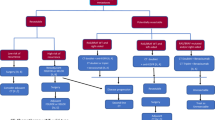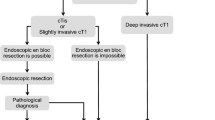Abstract
The treatment of advanced colorectal cancer has evolved significantly over recent years. The increasing and justified demand for timely and robust evaluation of emerging therapies has led to the careful evaluation of alternative end points for clinical trials beyond overall survival. This review offers insights into the advantages, limitations, and promise of existing and emerging efficacy end points of interest
Similar content being viewed by others
References and Recommended Reading
Yothers G: Toward progression-free survival as a primary end point in advanced colorectal cancer. J Clin Oncol 2007, 25:5153–5154.
Buyse M, Molenberghs G, Burzykowski T, et al.: The validation of surrogate endpoints in meta-analyses of randomized experiments. Biostatistics 2000, 1:49–67.
Buyse M, Burzykowski T, Carroll K, et al.: Progression-free survival is a surrogate for survival in advanced colorectal cancer. J Clin Oncol 2007, 25:5218–5224.
Burzykowski T, Buyse M: Surrogate threshold effect: an alternative measure for meta-analytic surrogate endpoint validation. Pharm Stat 2006, 5:173–186.
Tang PA, Bentzen SM, Chen EX, Siu LL: Surrogate end points for median overall survival in metastatic colorectal cancer: literature-based analysis from 39 randomized controlled trials of first-line chemotherapy. J Clin Oncol 2007, 25:4562–4568.
Dodd LE, Korn EL, Freidlin B, et al.: Blinded independent central review of progression-free survival in phase III clinical trials: important design element or unnecessary expense? J Clin Oncol 2008, 26:3791–3796.
Freidlin B, Korn EL, Hunsberger S, et al.: Proposal for the use of progression-free survival in unblinded randomized trials. J Clin Oncol 2007, 25:2122–2126.
Panageas KS, Ben-Porat L, Dickler MN, et al.: When you look matters: the effect of assessment schedule on progression-free survival. J Natl Cancer Inst 2007, 99:428–432.
US Food and Drug Administration: Guidance for industry: clinical trial endpoints for the approval of cancer drugs and biologics, 2007. Available at http://www.fda.gov/cber/gdlns/clintrialend.htm#iii. Accessed May 2009.
Carroll KJ: Analysis of progression-free survival in oncology trials: some common statistical issues. Pharm Stat 2007, 6:99–113.
Saltz LB, Clarke S, Diaz-Rubio E, et al.: Bevacizumab in combination with oxaliplatin-based chemotherapy as firstline therapy in metastatic colorectal cancer: a randomized phase III study. J Clin Oncol 2008, 26:2013–2019.
Therasse P, Arbuck SG, Eisenhauer EA, et al.: New guidelines to evaluate the response to treatment in solid tumors. European Organization for Research and Treatment of Cancer, National Cancer Institute of the United States, National Cancer Institute of Canada. J Natl Cancer Inst 2000, 92:205–216.
Buyse M, Thirion P, Carlson RW, et al.: Relation between tumour response to first-line chemotherapy and survival in advanced colorectal cancer: a meta-analysis. Meta-Analysis Group in Cancer. Lancet 2000, 356:373–378.
Louvet C, de Gramont A, Tournigand C, et al.: Correlation between progression free survival and response rate in patients with metastatic colorectal carcinoma. Cancer 2001, 91:2033–2038.
Grothey A, Hedrick EE, Mass RD, et al.: Response-independent survival benefit in metastatic colorectal cancer: a comparative analysis of N9741 and AVF2107. J Clin Oncol 2008, 26:183–189.
Eisenhauer EA, Therasse P, Bogaerts J, et al.: New response evaluation criteria in solid tumours: revised RECIST guideline (version 1.1). Eur J Cancer 2009, 45:228–247.
Tournigand C, Cervantes A, Figer A, et al.: OPTIMOX1: a randomized study of FOLFOX4 or FOLFOX7 with oxaliplatin in a stop-and-Go fashion in advanced colorectal cancer—a GERCOR study. J Clin Oncol 2006, 24:394–400.
Falcone A, Ricci S, Brunetti I, et al.: Phase III trial of infusional fluorouracil, leucovorin, oxaliplatin, and irinotecan (FOLFOXIRI) compared with infusional fluorouracil, leucovorin, and irinotecan (FOLFIRI) as first-line treatment for metastatic colorectal cancer: the Gruppo Oncologico Nord Ovest. J Clin Oncol 2007, 25:1670–1676.
Delaunoit T, Alberts SR, Sargent DJ, et al.: Chemotherapy permits resection of metastatic colorectal cancer: experience from Intergroup N9741. Ann Oncol 2005, 16:425–429.
Blazer DG 3rd, Kishi Y, Maru DM, et al.: Pathologic response to preoperative chemotherapy: a new outcome end point after resection of hepatic colorectal metastases. J Clin Oncol 2008, 26:5344–5351.
Allegra C, Blanke C, Buyse M, et al.: End points in advanced colon cancer clinical trials: a review and proposal. J Clin Oncol 2007, 25:3572–3575.
Sargent DJ, Hayes DF: Assessing the measure of a new drug: is survival the only thing that matters? J Clin Oncol 2008, 26:1922–1923.
Cohen SJ, Punt CJ, Iannotti N, et al.: Relationship of circulating tumor cells to tumor response, progression-free survival, and overall survival in patients with metastatic colorectal cancer. J Clin Oncol 2008, 26:3213–3221.
Sargent DJ, Rubinstein L, Schwartz L, et al.: Validation of novel imaging methodologies for use as cancer clinical trial end-points. Eur J Cancer 2009, 45:290–299.
Van Cutsem E, Kohne CH, Hitre E, et al.: Cetuximab and chemotherapy as initial treatment for metastatic colorectal cancer. N Engl J Med 2009, 360:1408–1417.
Tol J, Koopman M, Cats A, et al.: Chemotherapy, bevacizumab, and cetuximab in metastatic colorectal cancer. N Engl J Med 2009, 360:563–572.
Hecht JR, Mitchell E, Chidiac T, et al.: A randomized phase IIIB trial of chemotherapy, bevacizumab, and panitumumab compared with chemotherapy and bevacizumab alone for metastatic colorectal cancer. J Clin Oncol 2009, 27:672–680.
Nordlinger B, Sorbye H, Glimelius B, et al.: Perioperative chemotherapy with FOLFOX4 and surgery versus surgery alone for resectable liver metastases from colorectal cancer (EORTC Intergroup trial 40983): a randomised controlled trial. Lancet 2008, 371:1007–1016.
Hurwitz H, Fehrenbacher L, Novotny W, et al.: Bevacizumab plus irinotecan, fluorouracil, and leucovorin for metastatic colorectal cancer. N Engl J Med 2004, 350:2335–2342.
Goldberg RM, Sargent DJ, Morton RF, et al.: A randomized controlled trial of fluorouracil plus leucovorin, irinotecan, and oxaliplatin combinations in patients with previously untreated metastatic colorectal cancer. J Clin Oncol 2004, 22:23–30.
Tournigand C, Andre T, Achille E, et al.: FOLFIRI followed by FOLFOX6 or the reverse sequence in advanced colorectal cancer: a randomized GERCOR study. J Clin Oncol 2004, 22:229–237.
Author information
Authors and Affiliations
Corresponding author
Rights and permissions
About this article
Cite this article
Gill, S., Sargent, D.J. Evolving end points for clinical trials in advanced colorectal cancer. Curr colorectal cancer rep 5, 135–139 (2009). https://doi.org/10.1007/s11888-009-0020-y
Published:
Issue Date:
DOI: https://doi.org/10.1007/s11888-009-0020-y




